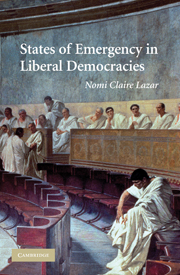Book contents
- Frontmatter
- Contents
- Acknowledgments
- States of Emergency in Liberal Democracies
- 1 The Problem of Emergency
- 2 Must Exceptionalism Prove the Rule?
- 3 Two Concepts of Liberalism
- 4 Are Rights Derogations Always Wrong?
- 5 The Rule of Law and the Roman Dictatorship
- 6 The Norms of Crisis Government
- Bibliography
- Index
6 - The Norms of Crisis Government
Published online by Cambridge University Press: 15 September 2009
- Frontmatter
- Contents
- Acknowledgments
- States of Emergency in Liberal Democracies
- 1 The Problem of Emergency
- 2 Must Exceptionalism Prove the Rule?
- 3 Two Concepts of Liberalism
- 4 Are Rights Derogations Always Wrong?
- 5 The Rule of Law and the Roman Dictatorship
- 6 The Norms of Crisis Government
- Bibliography
- Index
Summary
I have argued that those who justify emergency powers on the basis of exceptionalism free political leaders from moral constraint. This puts citizens at risk. Those who deny any justification for emergency powers by denying exceptions offer an approach that is little safer. They risk the very order that protects and embodies the rights they seek to champion. I have been concerned to show that the norm/exception dichotomy underlying both these perspectives, with which thinkers have long approached the problem of emergency, is wrong conceptually and dangerous in practice. It obscures more than it clarifies. To address this, I have developed in the previous chapters an alternative normative and conceptual framework grounded in the significant continuities between normalcy and emergency.
By rejecting exceptionalism as the framework through which we understand emergency powers, emergency institutions can be brought back within the normative domain. This means that despite the centrality of the rule of law and individual rights to liberal theory, emergency powers can sometimes be justified in a liberal democracy. Because, as I have shown, order and justice are intrinsically connected, and because the values underlying the rule of law can be furthered through a variety of formal and informal means, a liberal democracy can remain liberal democratic even while concentrating power and derogating rights. Emergency powers take on the moral character of the end they serve.
- Type
- Chapter
- Information
- States of Emergency in Liberal Democracies , pp. 136 - 162Publisher: Cambridge University PressPrint publication year: 2009



